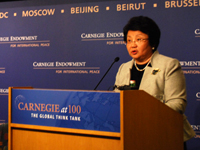Registration
You will receive an email confirming your registration.
IMGXYZ2911IMGZYXKyrgyzstan has seen a number of significant changes in the past year. In April 2010, a popular uprising against then-president Kurmanbek Bakiyev led to a new form of government. Following the outbreak of interethnic violence in the southern part of the country in June, Kyrgyzstan held a referendum and adopted a parliamentary system of government. In October, the country held free parliamentary elections. Kyrgyz President Roza Otunbayeva discussed Kyrgyzstan’s recent political achievements and the challenges that lie ahead. President Otunbayeva was introduced by Ambassador Robert O. Blake, assistant secretary of State for South and Central Asian Affairs. Carnegie’s Ambassador James F. Collins moderated.
President Otunbayeva outlined several areas that will remain important as Kyrgyzstan moves forward and establishes itself as a parliamentary democracy.
- Corruption and Organized Crime: The government has declared a crackdown on organized crime, which flourished during the era of privatization. Organized crime has become a serious burden for business and played a critical role in fueling interethnic violence during the June events, Otunbayeva said. In some cases, criminals had even infiltrated government institutions. Otunbayeva reported that over 90 members of organized criminal groups have been jailed since the crackdown began.
- Media: Kyrgyzstan now enjoys a free press and uncensored television, but these need to be fostered and strengthened, Otunbayeva said. She described the need for special support for the media, including training for journalists.
- Economic Environment: Kyrgyzstan seeks to develop an efficient economic model by promoting a friendly business environment, providing freedom for entrepreneurs, and facilitating economic growth throughout the country, especially in remote regions, Otunbayeva said. She acknowledged that corruption and organized crime must also be curbed as part of the effort to make Kyrgyzstan more attractive for business.
- Foreign Policy: Kyrgyzstan seeks to maintain good relations with all of its neighbors, including Russia, Otunbayeva said.
- Diversity and Multiculturalism: Otunbayeva described Kyrgyzstan as a multiethnic state, calling the country’s diversity a “source of development.” Around 30 percent of the country’s population are ethnic minorities, and they deserve equal treatment, she added.
- Border security: Otunbayeva stressed the need for improved border security to reduce weapons and drug trafficking, as well as the threat from extremist groups like the Islamic Movement of Uzbekistan (IMU). To be more effective, Kyrgyz troops will need significant financial support, she said. She added that while Kyrgyzstan will be working closely with Russia, it also sees an important role for the United States in bolstering security for Kyrgyzstan and the region. As an example, Otunbayeva expressed support for the proposed U.S. anti-terrorist training center in the Kyrgyz province of Batken, which borders Tajikistan and Uzbekistan.
- Judicial Reform: In the wake of the June violence, interethnic reconciliation depends not only on a policy of equal treatment for all ethnic groups, but also on the government’s success at guaranteeing justice and equality under the law, Otunbayeva said. To that end, the judicial system needs significant reform. She explained that the government is forming a committee to reappoint and select new judges, in order to guarantee a high degree of professionalism within the judiciary and ensure fair trials for those implicated in the June violence.
- Women in Politics: Otunbayeva pointed out that women comprise 27 percent of parliament. She pledged to push for the implementation of laws to increase the representation of women in various branches of government, and called for her government to provide women with a voice at the decision-making level in government and business.
